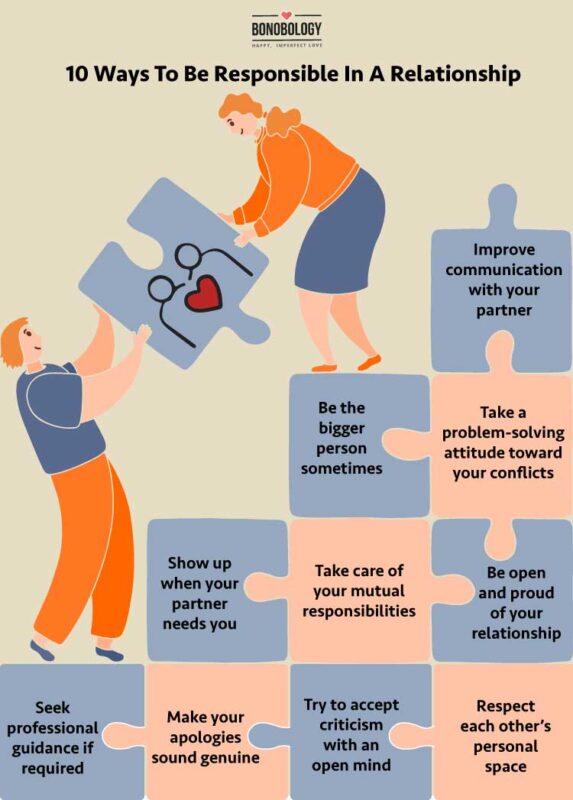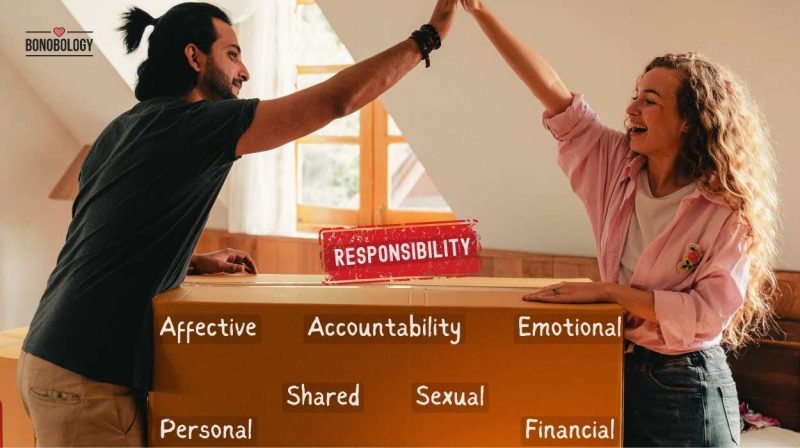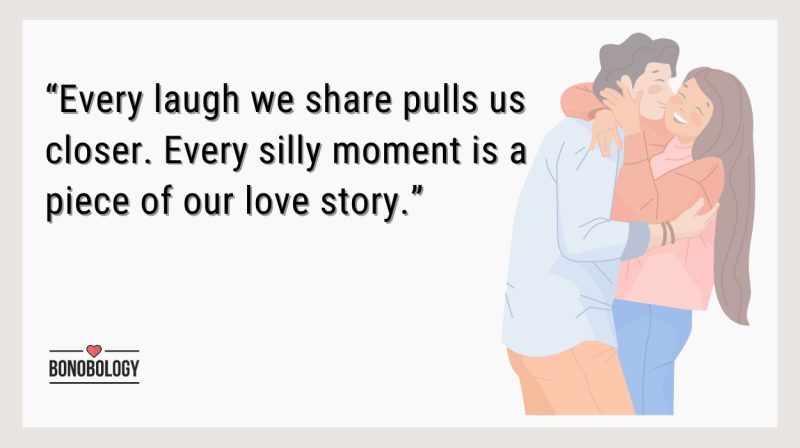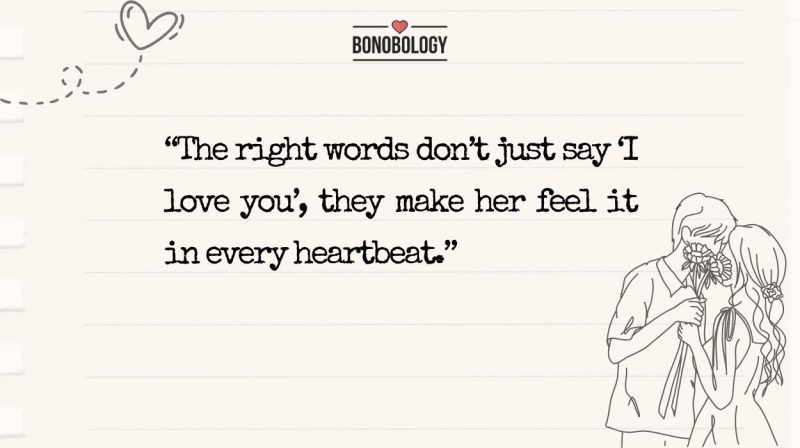Does the topic of responsibility in relationships leave you riddled with questions? What does being responsible in a relationship mean? Why is responsibility important? How different are the responsibilities of a man in a relationship from a woman’s? How do you show responsibility? And how can you become more responsible in a relationship? Well, we’ve done some spadework and got some answers. Let’s begin by understanding what does relationship responsibility mean.
In the broadest sense, to be responsible in a relationship means to be accountable for your own words, behaviors, and actions. It means ditching defensiveness and accepting responsibility for your part in relationship problems. It involves taking responsibility for your own moods and feelings, instead of basing your emotional temperature on your partner’s. It entails balancing roles and priorities and consistently showing up for your partner. Taking responsibility also means not assigning nor accepting any misplaced blame or guilt. Why is all this important? Let’s look into that next.
Importance Of Being Responsible In A Relationship
Table of Contents
The start of a relationship often feels like a dream coming true. But eventually, reality makes a grand entrance. And with it comes a bag full of daily humdrum, occasional irritations, and constant decisions. Now, this bag can get quite heavy, unless we learn to balance the load with our partner and make conscious choices for the sake of the relationship. That’s where taking responsibility comes in. So why is responsibility important? Here are some reasons:
- It helps build trust and honesty
- It allows you to bring your most authentic self to the relationship
- It lets your partner feel safe and be vulnerable with you
- It lets them know they can depend on you
That’s why we cannot state the importance of becoming responsible in a relationship enough. So how do we show responsibility to our loved ones? To understand that, we’ll need to look at the different forms of responsibilities in relationships.
Related Reading: 9 Expert Tips To Stimulate Vulnerability In A Relationship
The 7 Different Forms Of Responsibility In Relationships
A healthy relationship requires both partners to own their share of relationship roles and responsibilities. That isn’t always 50-50, as Michele Obama reminds. And it definitely doesn’t involve keeping score of who did what and who did more, or demanding someone do more. Well, unless you want to set up a home in Resentmentville.
Rather, taking responsibility is about being 100% present in the relationship and working as a team. It means providing emotional support and ensuring you and your partner have an equal share in decisions. And having your partner’s back during the hard parts. Or, when they drop the ball. These are some basic rights and responsibilities in relationships.
Taking responsibility in relationships is an organic process and relationship roles and responsibilities come in many forms, some of which are:
1. Taking responsibility for your emotions
Emotional responsibility means understanding that you are in charge of how you feel and no one else — including your partner. Emotional responsibility in relationships requires practicing emotional integrity and respecting emotional boundaries. However, emotional responsibility does not mean:
- Taking on your partner’s negative emotions or making excuses for them
- Thinking you need to meet every single one of their emotional needs
- Feeling it’s your job to make them happy every waking minute they spend with you and basing your self-worth on it
Taking responsibility for your partner’s emotions and basing your actions on how you think they’ll react are examples of over-responsibility in relationships. They are best avoided if you want to keep emotional burnout, enmeshment, or codependency at bay.
So, what does emotional responsibility in relationships look like? If your partner had a bad day at work, you hear them out. You try to understand how they are feeling. And you give them space to work through their feelings. But you don’t try to take on their feelings or ‘fix’ their mood.
2. Taking accountability for your words and actions

To take accountability in a relationship means to own your part and be willing to accept responsibility for your words and actions. Relationship accountability means:
- Practicing honest and open communication and trying to see your role in a situation, without making excuses for what went wrong or pretending things were out of your control
- Not getting defensive all the time or getting into a blame game
Trust me, a blame game or one-sided accountability in relationships will get you nowhere. Also, be mindful of the difference between accountability vs blame in relationships. Accountability involves both partners owning up to their mistakes and working through them. Blame involves one or both partners holding the other responsible for all wrongs.
So, what does it look like to take accountability in a relationship? When your partner brings up a relationship problem, you review your part in it. You acknowledge their concerns, and if they are valid, you take responsibility by saying, “I get your point” and “I could have been more understanding/more patient/less angry/less reactive…”
Related Reading: How To Deal With Someone Who Blames You For Everything — 21 Sensible Ways
3. Practicing personal responsibility
What does it mean to take personal responsibility in relationships? Here, taking responsibility means taking inventory of your values and responsibilities to yourself. And then, upholding them. It involves being honest about your motives for being in a relationship or staying in it. At times, it requires balancing rights and responsibility in relationships. And it requires self-awareness, self-control, and staying true to yourself. After all, if you are out of touch with yourself, how can you expect to genuinely connect with another person?
So, what does personal responsibility in relationships look like? Say you love adventure sports and your partner likes quieter activities. Rather than giving up on what you or they love, you both find ways to pursue your individual interests. Or, meet each other halfway.
4. Recognizing affective responsibility
According to studies, affective behavior in a relationship can be both positive, like humor, affection, and validation, or negative, like withdrawal, stonewalling, or harsh criticism. Affective responsibility requires you to:
- Practice self-awareness and become aware of how your words, feelings, and behaviors can and do affect your partner
- Ensure your words and actions don’t damage their self-worth or self-esteem
- Practice empathy, be willing to see things from their perspective, and choose your words mindfully
Let’s say you’ve been a little snarky to your partner and you know it. When your partner feels hurt by your comments and says so, you don’t rush to your own defense. Instead, you apologize sincerely and talk things through, without trying to play down what you said.

5. Being financially responsible
According to studies, money issues are a major source of conflict among couples. That’s what makes financial responsibility in relationships crucial. Taking responsibility here involves making financial decisions together, setting money goals, and being honest about your financial situation. So how can you build financial responsibility in relationships? Here are some ways:
- Decide whether you both want to create a joint account for sharing expenses or maintain your finances independently
- Make sure you contribute equally to every joint venture, or at least proportional to your respective incomes
- Do not hide credit card debt or reckless purchases
Keep in mind that constantly bailing your partner out of debt or feeling responsible for their poor financial decisions amounts to over-responsibility in relationships and is a relationship red flag.
Related Reading: Financial Planning Tips: Best Investment Ideas For Married Couples
6. Balancing shared responsibilities
After money, dividing responsibilities is another topic couples often argue and split hairs over. As per studies, the way you divide responsibilities has a big bearing on relationship satisfaction. So, what does shared responsibility in relationships come down to? Is it simply divvying up household chores equally? Or, switching up traditional gender roles while you’re at it? How do you factor in the invisible mental load, like keeping track of routines and worrying about bills?
And what do you do when there is an imbalance? How does the equal division of rights and responsibility in relationships work when one partner has a demanding job that takes up all their time and the other has to spend all their free time managing the house and taking care of the kids?
These are some questions on shared responsibility in relationships that you will have to work through with your partner. Remember, leaving all the physical and mental grunt work for your partner will make for an unhealthy relationship. And a resentful one.
7. Sexual responsibility
This covers aspects like practicing safe sex and being honest about sexual health or history, especially disclosures about any sexually transmitted infections or diseases. It requires understanding that sex is not an obligation in a relationship. And that any sexual activity has to be based on mutual consent. Both of you should be comfortable saying no to something you aren’t comfortable with.
10 ways to be responsible in a relationship
Based on personal experience, I am fairly certain that fear of responsibility in relationships and feeling overwhelmed by relationship demands are not issues to be ignored. So many of us fall into the trap of fear and give up on our chance at love. Or, end up repeating toxic patterns or trauma — till we begin to feel scared of being in a relationship. So much so that even the idea of long-term commitment makes us balk. And the emotional pressure that comes with taking responsibility makes us flake out, want to run away, or remain in a state of stagnancy in a relationship.
Sometimes, the only way out of fear is to work through it. Hard as it sounds, it can be done. Here are 10 strategies to develop the habit of taking responsibility in relationships:
Related Reading: 8 Common Fears In Relationships – Expert Tips To Overcome
1. Practice open communication
Free and open communication can go a long way to building a healthy relationship. How else would you know what’s going on in your partner’s mind? And how would they know what or when something triggers you? So don’t remain silent on the stuff that bothers just you because you dread confrontation. Find a way to talk about it, sans manipulation, shaming, or accusations. Or, you’ll risk building resentment and misunderstandings and spark a blame game later.
2. Be a problem-solver
Disagreements and differences in opinions are natural in a relationship. So, when a problem arises:
- Agree to disagree if you reach an impasse
- But avoid secretly thinking your partner is the problem
- Instead, try to find a middle ground, learn to compromise, and find a solution you both can live with
If you stick to a problem-solving approach, you will come out of the rough patches in the relationship stronger.

3. Respect each other’s personal space
All couples need space from time to time to recharge and reconnect with themselves, their goals, and their interests. Or, get the distance they need to reflect and get some perspective on sticky issues. Personal space means:
- Acknowledging each other as individuals, rather than as pieces of a puzzle or parts of a whole
- Developing a healthy respect for individual needs and time, rather than ignoring each other’s needs and feeling entitled to each other’s time.
Related Reading: How To Nurture Space In A Relationship
4. Be the bigger person sometimes
Learn to let the little things slide and focus on the things that do matter. Once in a while, be the more empathetic and understanding one. Learn to forgive and forget. Instead of trying to prove you are right or win an argument, set your ego aside and try to see things from your partner’s point of view. Maybe you’ll understand something you didn’t earlier.
5. Uphold mutual commitments and responsibilities
The word ‘responsibility’ won’t sound like a burden when you both are ready to share it. And you both hold up your end and follow through on mutual commitments. This requires practicing some self-accountability in relationships, and even, learning how to hold someone accountable in a relationship
Do remember: Relationship accountability does not mean holding your partner accountable for all missed commitments or ignored responsibilities while practicing zero accountability yourself.
6. Show up when your partner needs you
My friend, Andrew, is one of the most level-headed guys I know, who shows up for his partner consistently. So, I asked him what being accountable in a relationship and taking responsibility meant to him. He said, “Being responsible in a relationship, for me, means being reliable and trustworthy. And being there when your partner needs you. The moment you do, your partner will know this person cares deeply about me and respects my time and concerns.”
Showing up could simply mean:
- Giving emotional support
- Taking over some of their responsibilities if they are having a hard time
- Offering honest advice if they need it
- Being there, till they are ready to talk
Related Reading: 11 Warning Signs Of Lack Of Emotional Connection In Relationships
7. Be willing to apologize
This doesn’t mean you accept or internalize blame for things you didn’t do or had no role in. But if you did have a part in creating a situation, no matter how small, own up to it and find sincere ways to apologize. Be willing to accept the consequences. Tell your partner how you plan to make up for it or ensure the same thing doesn’t happen again. And then follow through.
8. Learn to take well-intended criticism for what it is
While no one likes to be judged, criticism doesn’t always have to be a bad thing. Rather than snapping at your partner or going mum, here’s what you can do:
- Don’t shut them out or the possibility that they may be correct
- Keep an open mind, listen carefully, and ask questions to understand where they’re coming from
- Remember your partner is invested in you and your relationship and hard as it may have been to hear, check if what they’ve said is valid. If it’s not, say so respectfully and calmly
9. Be proud and open about your relationship

Nobody likes their relationship to be a secret unless it’s something both partners have decided on. So, flaunt your partnership – show the world how happy and grateful you are to have your partner in your life. They should know that you prioritize your relationship and you will protect what you have with them. Show them they are your priority by:
- Scheduling one-on-one time with them
- Seeking and respecting their thoughts and opinions
- Taking their side when the situation demands it
Related Reading: 10 Biggest Priorities In A Relationship
10. Seek help if you feel the need for it
If you feel that some professional guidance would help answer your concerns and help you to better navigate rights and responsibilities in relationships, then seek it by all means. You can even consult Bonobology’s panel of counselors for help.
Key Pointers
- Relationship responsibilities can take different forms and include emotional, financial, personal, shared, affective, and sexual responsibility
- Taking responsibility can help cement trust and allow room for vulnerability and growth
- When it comes to taking responsibility, there are no substitutes for open communication, a problem-solving attitude, and respect for personal space
- Also, follow through on your commitments and try to hear out any criticism with an open mind
- Apologize when you need to and be willing to forgive and forget
- Try and show up when your partner needs you and if you feel the need, get help
Fear of responsibility in relationships can be crippling. But love based on many years of shared responsibilities isn’t something to fear. Rather, it’s at the heart of long-lasting and healthy relationships. That’s why we cannot state the importance of becoming responsible in a relationship or emphasize it enough.
FAQs
It’s important to be responsible in a relationship to build a healthy and long-term bond. The moment you start to show up, take accountability, and manifest honesty in your relationship, it will improve. You will feel more confident about your role in the partnership and your loved one will be able to trust and depend on you without thinking twice.
There are some strategies you can use for building a responsible partnership such as healthy communication, respecting each other’s personal space, owning up to your mistakes, managing conflict with a problem-solving attitude, and fulfilling your commitments.
What Is An Enmeshed Relationship? Signs And How To Set Boundaries
What Does ‘Holding Space For Someone’ Mean And How To Do It?
Your contribution does not constitute a charitable donation. It will allow Bonobology to continue bringing you new and up-to-date information in our pursuit of helping anyone in the world to learn how to do anything.






















Featured
130 Beautiful Things to Say About Your Wife
101 Silly Questions To Ask Your Partner For Fun, Laughter, And Bonding
200 Heart Touching Love Messages For Her
50 вопросов с подвохом, которые стоит задать своему парню
250 випадкових запитань, які можна задати своєму хлопцеві
Kız Arkadaşınızın Bayılacağı 170 Şirin İsim
21 sinais de que ele gosta de fazer amor com você
101 Όμορφα κομπλιμέντα για γυναίκες για να λιώσουν τις καρδιές τους
140+ χαριτωμένα ψευδώνυμα για να καλέσετε τον φίλο σας
35 cartas de amor para él que lo harán llorar
35 lettres d’amour pour lui qui le feront pleurer
Uzmanlar Tarafından Desteklenen Erkek Vücut Dili Çekiciliğinin 20 İşareti
25 lettres d’amour profondément émouvantes pour elle qui la feront pleurer
35 lettere d’amore per lui che lo faranno piangere
10 Mutlaka İzlenmesi Gereken Genç Erkek Yaşlı Kadın İlişki Filmleri
25 lettere d’amore profondamente emozionanti per lei che la faranno piangere
45 сексуальних, брудних текстових повідомлень для вашого хлопця
45 Σέξι, Βρώμικα Μηνύματα για τον Φίλο σου
45 mensajes de texto sensuales y atrevidos para tu novio
Erkek Arkadaşınız İçin 45 Seksi, Müstehcen Mesaj